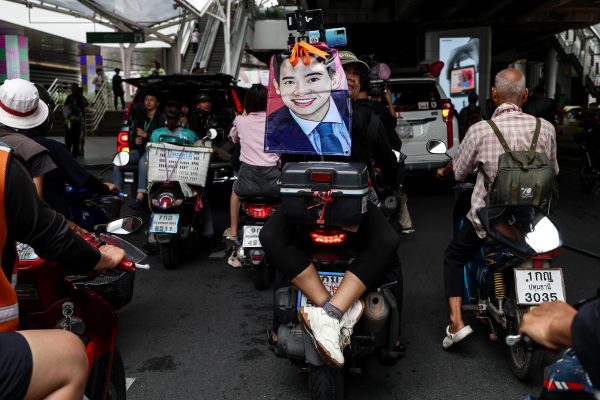In a double-barrelled onslaught, the Constitutional Court suspended him from duties as a member of parliament just as parliament began debating whether to allow his renomination for prime minister. Unsurprisingly, the parliamentary vote — which included the junta-appointed senate — went against Pita. While it could be argued that these events were foreseeable and that Pita’s fate was sealed long before last Wednesday, they did shift Thailand’s political landscape to further empower conservative actors.
The 2017 constitution, designed by the military junta that directly ruled the country from the 2014 coup until the 2019 election, was written specifically to prevent elected politicians from obtaining power without at least the tacit approval of the conservative coup group and their supporters. The junta-appointed senate’s role in voting for the prime minister raises the majority threshold from 251 seats in the 500-seat elected House of Representatives to 376 seats in the combined 750-seat parliament. This effectively gives the senate veto power over any prime ministerial candidate.
But parliament did not vote on Pita’s candidacy on 19 July. Instead, the opposition raised a parliamentary rule that prohibits the resubmission of a rejected motion within the same parliamentary session. They argued that since parliament had already rejected Pita on 13 July, he could not be renominated. After eight hours of tense debate, including Pita’s dramatic exit from parliament after the Constitutional Court ruling, the vote fell largely along coalition lines with 395 parliamentarians opposing his renomination and 312 supporting it. Most opposing votes came from the senate.
This sets a troubling, potentially unconstitutional, precedent. The next prime ministerial vote has been postponed (again) as parliament waits for the Constitutional Court to weigh in. If the decision stands, it means that any prime ministerial candidate has only one shot at establishing a government. The implications of this are multi-fold.
One implication is that the decision increases the stakes of submitting a prime ministerial candidate’s name for a vote, with no second chance to carry out negotiations or horse-trading after gauging support for the candidate. As constitutional rules limit potential prime ministerial candidates to those who have been pre-nominated by parties that won at least 25 seats in parliament, there are now only three potential names eligible in the coalition formerly led by Move Forward, all of whom are from the Pheu Thai party.
Move Forward has stepped aside, leaving Pheu Thai to manage its three chances to form a government. It faces the difficult choice of which candidate to submit for the next parliamentary vote (reportedly Sretta Thavisin), with the risk that each attempt may fail to win over enough senators. The party has also decided to move forward without Move Forward in its coalition, knowing that most senators are clearly opposed to the party and its policies.
Tensions had already appeared in the relationship between Pheu Thai and Move Forward, so striking out to form a new coalition may seem the strategic choice. But turning against Move Forward will be unpopular. Pro-democracy voters who initially celebrated the victory over the pro-military parties are becoming increasingly angry and despondent over their struggle to form a government, and many already feel betrayed.
Without Move Forward’s 151 seats, Pheu Thai’s options for forming a coalition are limited, and if Pheu Thai allies with pro-military forces to gain the prime minister’s seat, the party could permanently lose many voters. But if it does not, it is unlikely to win enough senate votes to form a government. Pheu Thai is in a tight spot.
A second implication is that the bargaining power of the unelected senate has increased. It is widely accepted that the senators will be opposed to any prime ministerial candidate who espouses liberal values or seeks to undermine the role of unelected actors, such as the military, in Thai politics.
Repeatedly submitting the same candidate would have given Move Forward or Pheu Thai information about senatorial preferences as well as time to negotiate with those who might be persuaded to support the coalition. Not to mention the opportunity for public pressure to mount and potentially influence senators. By reducing the opportunity for repeated votes, the senate further places itself beyond accountability.
A final implication of the parliamentary decision is that a one-shot prime ministerial vote empowers the parties previously allied with General Prayut Chan-o-cha. It is almost a foregone conclusion that General Prawit Wongsuwan, the prime ministerial candidate from the Phalang Pracharath Party and a close ally of General Prayut, would be supported by most senators for the prime minister’s seat.
If Prawit were to form a coalition with the parties excluded from the Move Forward coalition, he could easily form a minority government of 188 seats with senate support. While a minority government would face substantial problems legislating, the alliance with the appointed senate would grant substantial leverage. Whether Prawit will throw his hat in the ring is an open question. He may be strategically waiting for Pheu Thai to fail in its three prime ministerial chances.
Thailand’s political morass was designed by the authors of the 2017 constitution. The charter, created to limit the influence and capacity of popularly elected politicians, is operating as intended.
Jacob Ricks is Associate Professor of Political Science in the School of Social Sciences at Singapore Management University.

